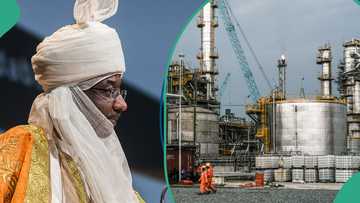Surveyor General Calls For Adequate Funding to Address Climate Change
- The Surveyor General of the Federation, Adebomeyin Abdulganiyu, has asked for increased funding to combat climate change
- He highlighted the importance of the funding at the launch of Climate Education and Awareness recently
- He also emphasised the relevant role of surveying in understanding and mitigating the impacts of climate change.
Don't miss out! Join Legit.ng's Sports News channel on WhatsApp now!
Adebomeyin Abdulganiyu, the Surveyor General of the Federation, has called for increased funding to tackle the pressing challenges posed by climate change.
The Surveyor General appealed the launch of Climate Change Education and Awareness on Saturday, September 28, 2024, in Abuja.

Source: Original
The SGF demonstrates how to calculate measurement
He said that climate change is not an abstract concept; it is a reality that affects millions of Nigerians every day. From the coastal erosion in Lagos to the desertification in the North, the nation is facing a crisis that demands immediate action and investment.
He also emphasised the relevant role of surveying in understanding and mitigating the impacts of climate change.
He illustrated how accurate land measurements and geospatial data are essential for effective urban planning, disaster management, and environmental conservation.
“We need to know where we stand to make informed decisions about where we’re going,” he urged the government to prioritise funding for surveying initiatives.
The Surveyor General highlighted a recent survey conducted in the Niger Delta region, where rising sea levels and oil spills have devastated local ecosystems and communities.
Climate change displaces families
“Families that have lived off the land for generations are now facing displacement,” he lamented.
“We are responsible for providing them with the data they need to adapt and thrive in a changing environment.
“My call for funding is not just about resources; it is about the future of Nigeria’s people and their livelihoods,” he said.
Abdulganiyu also called for establishing a dedicated Climate Resilience Fund to allocate resources specifically for research and community-based projects to mitigate climate impacts.
“This fund should empower local communities to take ownership of their futures,” he said.
The need to create awareness of climate change
Also speaking, Chief Dominic Ogakwu, the founder of Ambassadors of SDGs and Ecosystem Preservation Initiative, stressed the importance of educating the public on climate change mitigation, global best practices and the inherent risks associated with climate change issues.
Highlighting the significance of effective information dissemination, Ogakwu pointed out that improved education and awareness could help prevent disasters such as the recent floods if the information had been shared proactively.
“For example, the devastating flooding in Borno state could have been prevented with adequate education and awareness alerts from authorities and communities.
“So, we need people who can relay critical information to the right channels effectively,” he said.
He also emphasized the need to use the media to spread information widely and counter misinformation by empowering volunteers through data subsidies, stipends, and other forms of support to drive climate change campaigns at the grassroots level.
“Through our initiative we are set to launch a seven-month campaign covering all the 774 local government areas across Nigeria, utilising a comprehensive education strategy,” he said.
UN: Africa faces disproportionate burden from climate change
Legit.ng reported that Africa faces a disproportionate burden from climate change and the costs of adapting, the World Meteorological Organization (WMO) said in a new report on Monday.
The African continent has been warming at a slightly faster rate than the global average -- at about 0.3 degrees Celsius per decade between 1991 and 2023, the WMO said in its report on the state of the climate in Africa last year.
North Africa experienced the most rapid warming, it said. The city of Agadir in Morocco reached a new maximum temperature of 50.4 degrees.
PAY ATTENTION: Сheck out news that is picked exactly for YOU ➡️ find the “Recommended for you” block on the home page and enjoy!
Source: Legit.ng





